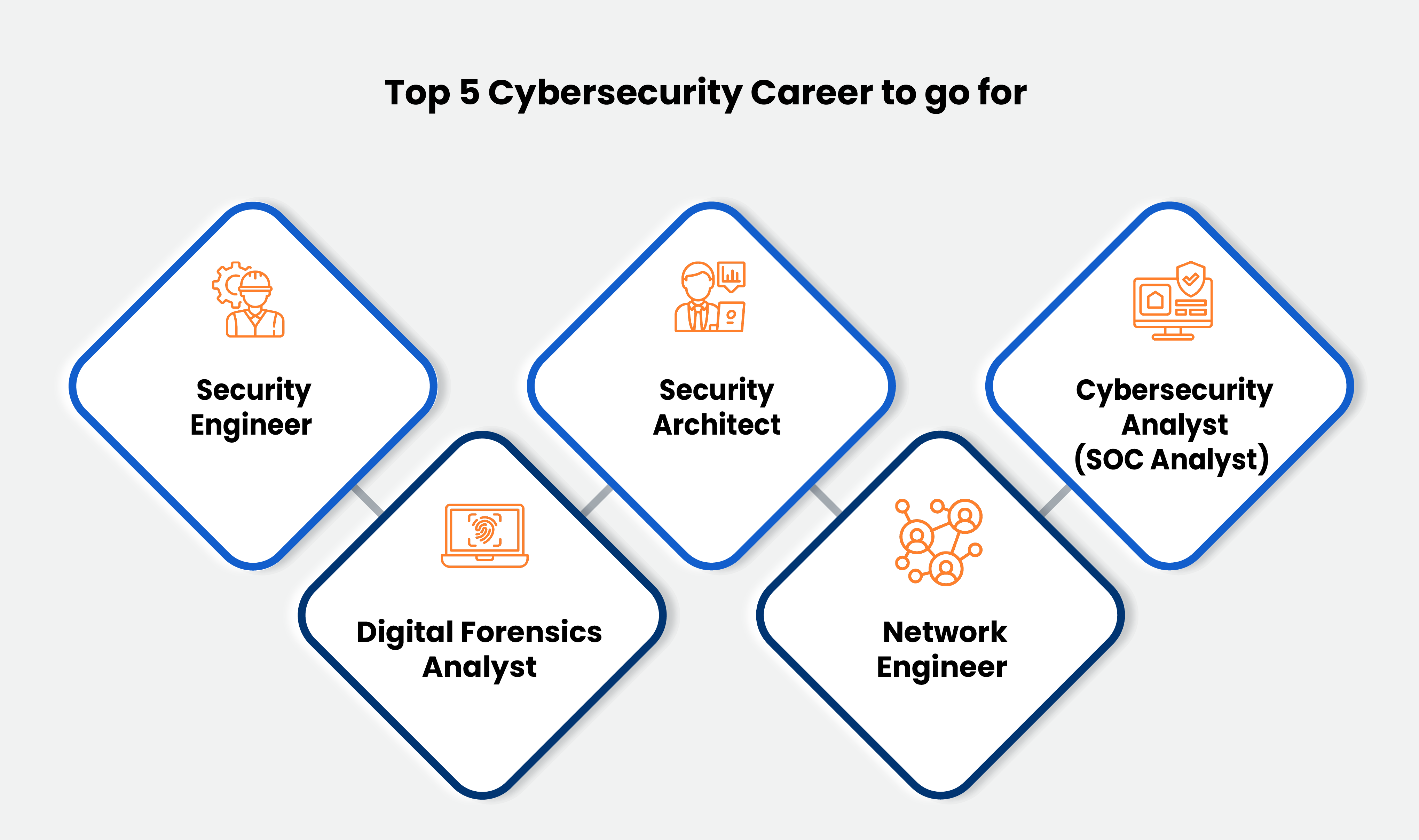Don’t Get Breached: Secure Your Organization with These 5 In-Demand Cybersecurity Roles in 2024
In the ever-expanding digital frontier, a silent war rages. Every click, every message, every connected device generates data that is the very lifeblood of our modern world. But with this interconnectedness comes a chilling reality: cyber threats are multiplying at an alarming rate.
Global cybersecurity job vacancies have increased by 350 percent, going up from a mere 1 million openings in 2013 to 3.5 million in 2021. Despite industry efforts, this number remains stubbornly high at 3.5 million in 2023, with over 750,000 unfilled positions waiting in the U.S. alone.
The message is clear: the demand for cybersecurity professionals has never been greater.
The tide is turning, and this blog post is your invitation to ride the wave. We’ll be your guide as we explore the dynamic landscape of cybersecurity careers for your organization.
Beyond ethical hacking: Expanding Your Cybersecurity Workforce
While ethical hacking often takes center stage in cybersecurity, the reality is this dynamic field offers a wealth of exciting career paths. From security architects to digital forensics investigators, there’s a role waiting for nearly every skill set and interest.
Here are five key cybersecurity roles that extend beyond ethical hacking, offering a well-rounded approach from an organizational perspective:
Security Engineer
These are the jack-of-all-trades in the security realm. They build firewalls, detect vulnerabilities, and implement security protocols. They’re constantly on the lookout for threats, patching systems, and ensuring everything runs smoothly.
Education: A bachelor’s degree in computer science, information technology, or cybersecurity
Develop strong analytical and problem-solving skills. Familiarity with networking concepts and security tools like firewalls and intrusion detection systems (IDS) is a big plus.
Security Architect
Think of them as the grand designers of secure systems. They possess a deep understanding of security best practices and emerging threats. Their job is to translate that knowledge into robust security frameworks that safeguard organizations from cyberattacks.
Education: A bachelor’s degree in computer science or information technology is a strong foundation. A master’s degree in cybersecurity or a related field can give you a competitive edge, especially for senior-level positions.
Earning certifications like CISSP (Certified Information Systems Security Professional) will demonstrate your expertise and open doors to leadership positions.
Cybersecurity Analyst (SOC Analyst)
SOC analysts are watchful guardians, constantly monitoring security systems for suspicious activity. They analyze potential incidents, initiate response protocols, and work tirelessly to contain and mitigate threats.
Education: A bachelor’s degree in computer science, information technology, or cybersecurity is ideal. However, some positions may be attainable with an associate’s degree and relevant experience in IT security.
Develop strong communication and collaboration skills and the ability to work effectively under pressure and analyze complex data for success in a SOC environment.
Digital Forensics Analyst
When a cybercrime occurs, these detectives step in. They collect and analyze digital evidence, meticulously piecing together the puzzle of an attack. Their work helps identify culprits, recover stolen data, and provide vital evidence for legal proceedings.
Education: A bachelor’s degree in computer science, information technology, or a related field focusing on digital forensics is preferred. Certifications like EnCE (EnCase Certified Examiner) can enhance your resume.
Attention to detail and a strong understanding of digital forensics techniques are essential. Certifications like EnCE (EnCase Certified Examiner) can enhance your resume.
Network Engineer
They ensure the smooth flow of information within a network. They design, install, configure, and maintain computer networks, ensuring devices can communicate effectively and securely. Network engineers troubleshoot network issues, optimize performance, and stay ahead of potential problems.
Education: A bachelor’s degree in computer science, information technology, or network engineering is ideal. Certifications like CompTIA Network+ or CCNA (Cisco Certified Network Associate) can demonstrate your proficiency and open doors to entry-level positions.
Develop strong analytical and problem-solving skills. A solid understanding of networking concepts, protocols, and troubleshooting techniques is essential. Familiarity with network security principles is a plus.
Essential Skills Needed for Our Cybersecurity Team
A fact about the cybersecurity field is that it brings a change in itself with a change in technology and its application. What’s good today has the great potential of being gone tomorrow and hence, you should be hands-on with the new and mushrooming things like AI and orchestration. New skills will help you stay afloat over here.
But, as far as the skills are concerned, you should have proper applicable knowledge for effective task carrying and completion. The potential skills can include the following:
- Ethical hacking skills
When you understand the nature of a cyber attack, you find yourself in a better place to develop effective solutions for the same and protect the data, and the organization.
- Programming skills
You have an edge when you can get a stronghold on programming skills like disassemblers, Java, C, and C++, followed by scripting languages. When you know these skills, it helps you to find loopholes and detect any potential attack. Counterattacks can be planned accordingly.
- Cloud security skills
Organizations are moving towards cloud platforms. Hence, similar skills are needed. So, focus on protecting the stored data online through platforms that ensure protection against theft, deletion, and leakage.
- Application development security skills
Also, proficiency in app development is needed in a competitive world like today’s. Hence, focus on learning security and testing skills to improve your territory for working.
Charting Your Course
Feeling overwhelmed by the vast landscape of cybersecurity? AntWalk’s ARCH score can be your compass. AntWalk empowers individuals and organizations to excel in the digital age by offering:
- Skill Development: Upskill yourself and your team with courses, workshops, and certifications aligned with industry best practices.
- Capability Building: Build a culture of security awareness and empower employees to make informed decisions.
- Performance Optimization: AntWalk’s data-driven insights help organizations optimize their cybersecurity posture.
Conclusion
The cybersecurity field is indeed here to stay, especially with the increasing prevalence of virtual work environments. As such, it presents excellent opportunities for individuals to contribute to its growth through their skills and knowledge. However, it’s essential to recognize that cybersecurity encompasses much more than hacking and breaches. To truly address the multifaceted nature of cybersecurity, individuals need access to proper learning, courses, skills, and training that extend beyond traditional norms.

This quote emphasizes the need for a comprehensive approach to cybersecurity, one that goes beyond the stereotypical image of hackers and breaches.
The future of cybersecurity is bright, and it’s waiting for you to join the frontlines.
Key Takeaways
- Cybersecurity is a broad and diverse field with a wide range of career opportunities
- The demand for cybersecurity professionals is skyrocketing
- Your work will have a tangible impact, protecting individuals, businesses, and governments from cyber threats.
- Upskilling and training initiatives are crucial to addressing the cybersecurity skills gap
- The career path offers intellectual challenges, variety, and the chance to build a rewarding and impactful future.
Mission:
We help Organizations measure and build Capabilities in line with their Business Priorities. Begin your journey to a more capable organization at AntWalk.















